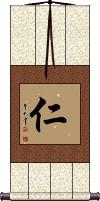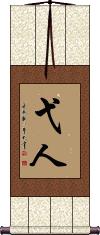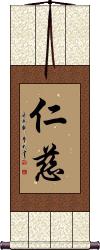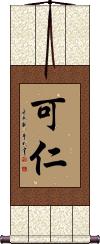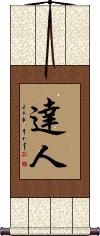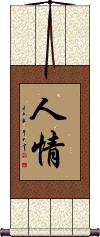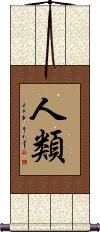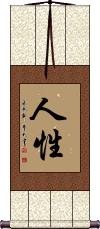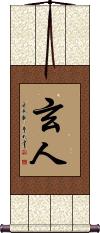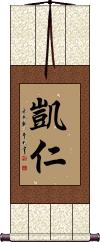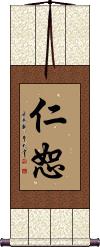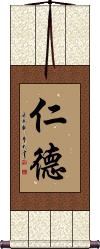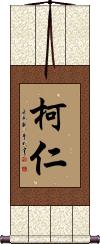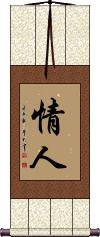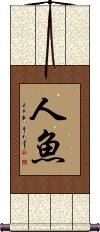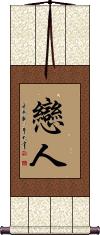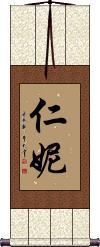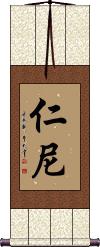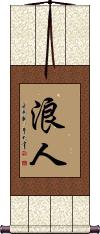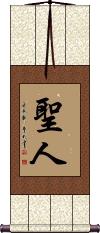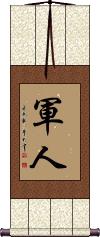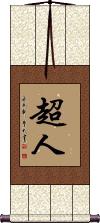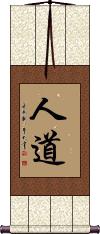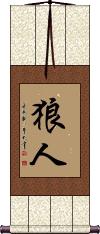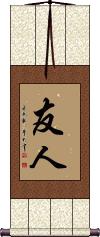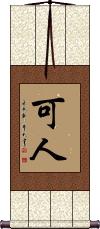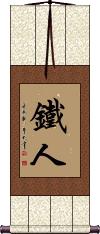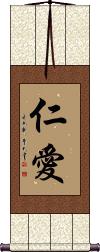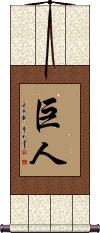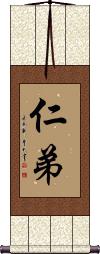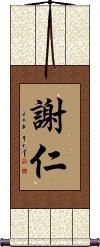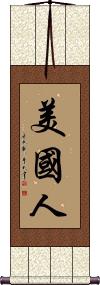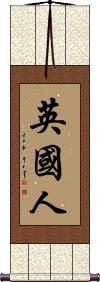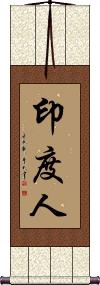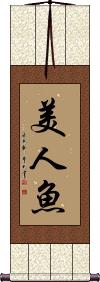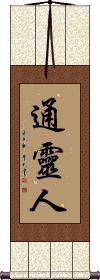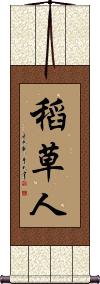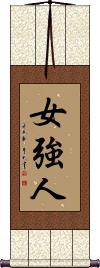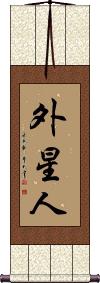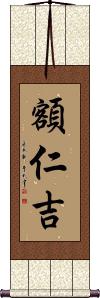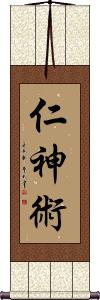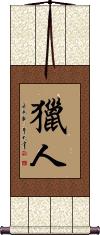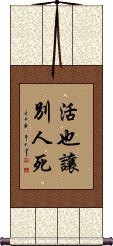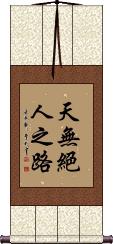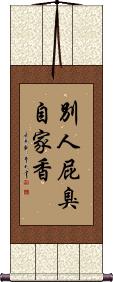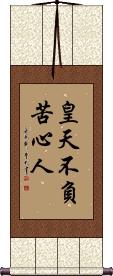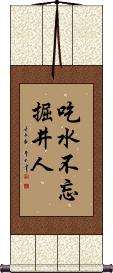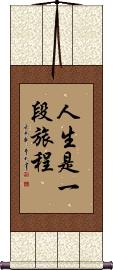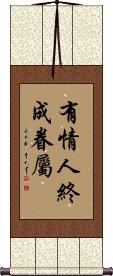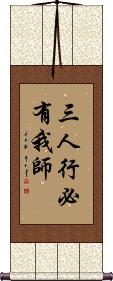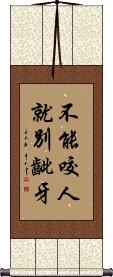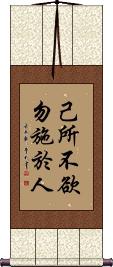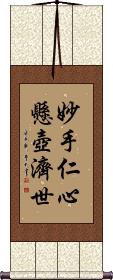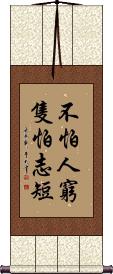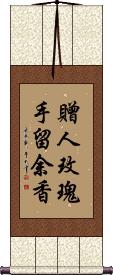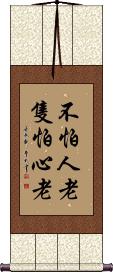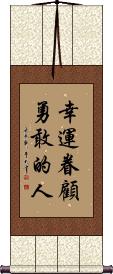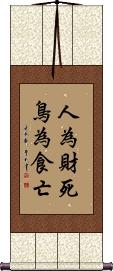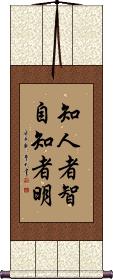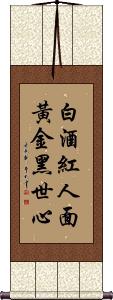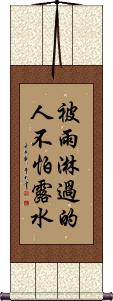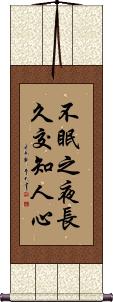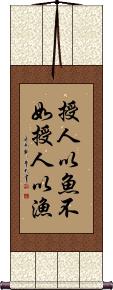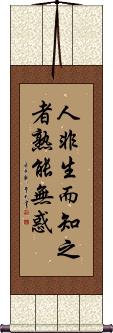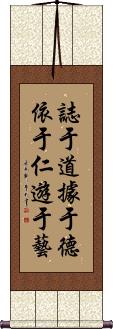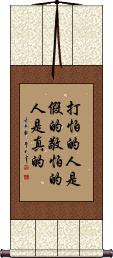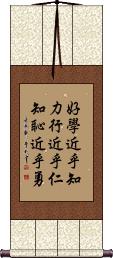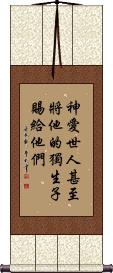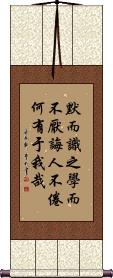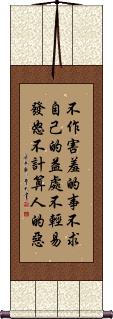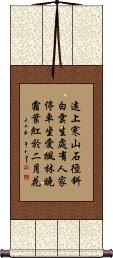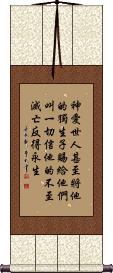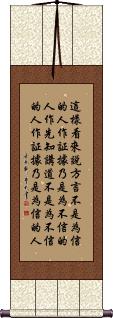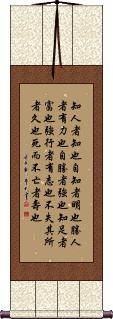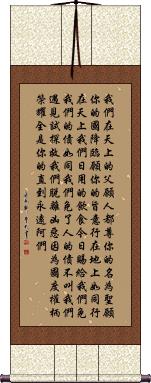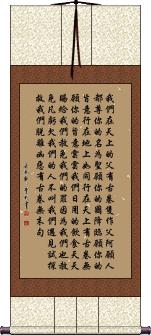Many custom options...
And formats...

Ren2 in Chinese / Japanese...
Buy a Ren2 calligraphy wall scroll here!
Personalize your custom “Ren2” project by clicking the button next to your favorite “Ren2” title below...
1. Benevolence
2. Archer
4. Coreen
5. Daren
7. Human Race / Humanity / Mankind
8. Human Nature
10. Kieran
11. Kindness and Forgiving Nature
12. Kindheartedness / Benevolence / Humanity
13. Koren
15. Mermaid / Merman
16. Lover / Beloved
17. Renni
18. Renny
19. Ronin / Masterless Samurai
20. Holy Man / Saint
22. Superman
23. The Tao or Dao of Being Human / Humanity
24. Werewolf
25. Yujin
26. Keren
28. Benevolent Love
29. Giant
30. Rendi
31. Sheren
32. American
33. English / Briton / Person from England
34. Indian
35. Mermaid
36. Psychic
37. Scarecrow
38. Strong Woman
39. Star Man
40. Erenji
41. Jin Shin Jyutsu
42. Hunter
45. American Soldier / American Serviceman
46. Benevolent and Skilled Doctor
47. Helpfulness
48. Impartial and Fair to the Brotherhood and Sisterhood of the World
49. Irish
50. Italian
51. Life in Balance / Balancing Life
53. Life is Good
54. Military Veteran / Retired Soldier
55. Oneness of Heaven and Humanity
56. Tiger Rumor
58. Fresh Start
60. Beautiful Woman
61. The Five Tenets of Confucius
62. Live and Let Die
64. You are always a beauty in your lover’s eyes
65. The farts of others stink, but one’s own smells sweet
67. Drinking the water of a well: One should never forget who dug it
70. When Three People Gather, One Becomes a Teacher
71. If you cannot bite, do not show your teeth
72. Confucius: Golden Rule / Ethic of Reciprocity
73. Benevolent and Skilled Doctor
74. Do not fear poverty; Fear low ambitions
75. Rose Flowers Given, Frangrance Remains on Hands of Giver
76. You are only as old as you feel
78. Men Die for Wealth, Birds Die for Food
79. Those Who Understand are Clever, Those Who Know Themselves are Truly Wise
80. Just as Liquor Turns a Face Red, Gold Turns a Heart Black
81. One who is drenched in rain does not fear drops of dew
82. Only the sleepless know the length of night
84. We are not born with knowledge, how does one achieve maturity?
85. The Foundation of Good Conduct
86. Respect out of fear is never genuine; Reverence out of respect is never false
87. Learning leads to Knowledge, Study leads to Benevolence, Shame leads to Courage
88. John 3:16
92. Mountain Travels Poem by Dumu
93. John 3:16
95. Daodejing / Tao Te Ching - Chapter 33
Benevolence
Beyond benevolence, 仁 can also be defined as “charity” or “mercy” depending on context.
The deeper meaning suggests that one should pay alms to the poor, care for those in trouble, and take care of his fellow man (or woman).
仁 is one of the five tenets of Confucius. In fact, it is a subject that Confucius spent a great deal of time explaining to his disciples.
I have also seen this benevolent-related word translated as perfect virtue, selflessness, love for humanity, humaneness, goodness, goodwill, or simply “love” in the non-romantic form.
This is also a virtue of the Samurai Warrior
See our page with just Code of the Samurai / Bushido here
Archer
Ancient title for Archer
弋人 is the ancient way to write archer in both Chinese, Korean and Japanese.
If you carried a bow into battle in an army of ancient Asia, this would be your title.
Note: 弋人 is an antiquated term that is rarely used in modern Chinese, Korean or Japanese. Beyond archer, this can also mean a ceremonial hunter in Japanese.
Note: This title is so old, that most Asian people will not recognize this as a normal word. It has not been in regular use for many generations.
Kindness / Benevolence
仁慈 word is used in Chinese, Korean, Japanese, and Asian Buddhism to relay the important idea of loving kindness.
仁慈 can also be defined as: benevolent; charitable; kind; merciful; kind-hearted; benevolence; kindness; humanity; mercy.
In Japanese, this can also be the given name Hitoji. This would also be a good Mandarin Chinese given name romanized as Jentzu (in Taiwan) or Renci (which sounds like ren-tsuh).
Coreen
Daren
Empathy / Humanity
人情 is a title that can apply to a lot of meanings, including humanity, empathy, kindness, sympathy, human nature, human emotions, or human interaction.
Human Race / Humanity / Mankind
人類 is the way to say mankind or humankind in Chinese.
It's kind of the “animal title” for humans. 人類 is the word you would use if you said this phrase in Chinese, “Mammals include dolphins, monkeys, dogs, and humans among others.”
人類 is a weird selection for a calligraphy wall scroll. But a customer begged me to add this word.
Human Nature
人性 is a title that is the essence of what it means to act and be human.
These two characters refer to the way we are as people.
人性 is also sometimes translated as human personality, human instinct, humanity, or humanism.
The first character literally means human or people.
The second character means nature. It can also mean property, quality, attribute, or essence. It can even be a modifier like “-ity” or “-ness,” which is why this word is also translated as “humanity.”
Whore / Mysterious Woman
Danger: Means prostitute in Japanese!
玄人 literally means “Mysterious Person/Woman.”
In Japanese, this is associated with a “geisha,” which matches this definition of a “mysterious woman.” However, this is the colloquial way to say “professional geisha” or “expert prostitute” in Japanese. It, therefore, might not be what you want on your wall.
Notes: This is a "Japanese only" term, though a Chinese person who sees these characters will think of a geisha or an alluring Japanese female musician.
While not often seen in Korean Hanja, this would mean a "dark woman," as in a woman that you cannot easily see through.
Kieran
Kindness and Forgiving Nature
仁恕 is a word in Chinese and Japanese that means something like benevolence with magnanimity or kindness with a forgiving nature.
If this describes you, then you are the type of person that I would like to call my friend.
This may not be the most common word in daily use, but it's old enough that it transcended cultures from China to Japan in the 5th century when Japan lacked a written language and absorbed Chinese characters and words into their language.
Note: 仁恕 is not commonly used in Korean.
Kindheartedness / Benevolence / Humanity
仁德 is a word that can be translated as love, kindheartedness, benevolence, and humanity.
The first character means benevolence by itself.
The second character means virtue or morality.
Japanese note: The second Kanji of this word has been slightly simplified (one tiny horizontal stroke removed). It is still readable for Japanese but if you select our Japanese calligrapher, expect that stroke to be missing on your wall scroll.
Koren
Lover / Sweetheart
情人 means lover, sweetheart, or beloved in Chinese and Japanese Kanji.
This term is gender-neutral so anyone can use it.
Please note that this term can easily be read or used to mean “mistress” or the kind of lover you have an affair with (especially in Japanese). The context in which this word is used affects the actual meaning. Husbands and wives or boyfriends and girlfriends can also use this term for each other with no ill meaning.
Mermaid / Merman
(Unisex)
人魚 is the Japanese Kanji, Korean Hanja, and Chinese word for “merman” or “mermaid.”
It literally means “human fish.”
人魚 is a non-gender-specific or unisex word in all three languages.
Lover / Beloved
戀人 means lover, sweetheart, or beloved in Chinese, Japanese Kanji, and old Korean Hanja.
This term is gender-neutral, so that anyone can use it.
![]() In modern Japan and China, the first character has been simplified. We suggest the traditional version, as shown above if your audience is Chinese or Korean. However, this generation of Japanese are more likely to recognize the simplified version. If you want this simple (modern Japanese) version, please click on the image shown to the right, instead of the button above.
In modern Japan and China, the first character has been simplified. We suggest the traditional version, as shown above if your audience is Chinese or Korean. However, this generation of Japanese are more likely to recognize the simplified version. If you want this simple (modern Japanese) version, please click on the image shown to the right, instead of the button above.
Renni
This is a name Renni in Mandarin Chinese. The name literally means “benevolent girl” in Chinese.
I kind of made up this name when my second daughter was born. The idea came for a feeling I got after performing a benevolent act for a poor family in Southern China. I want my daughter to follow that mode, and experience the same feeling one can only experience by doing benevolent acts.
Renni
Renny
Ronin / Masterless Samurai
The 浪人 or Ronin have no master - The most famous are the 47 ronin created after their Lord committed suicide. This term was not a positive title for the Samurai of ancient Japan. However, in recent years, movies and video games have glorified the term Ronin.
In Chinese, this term has the original meaning of a hobo, vagabond, or ruffian.
In Korean Hanja, these characters would be read as adventurer, wanderer, someone without a steady job, or someone who is wasting away time.
In modern Japan, this term is used as a nickname for a high school student who has failed a college entry exam (and is trying again).
In Chinese and Korean, the Japanese definition of “Masterless Samurai” is known because of the historical context. Even in Japanese, the literal translation is closer to the Chinese and Korean definitions shown above.
This will make a fine wall scroll if you are a fan of the Ronin or see yourself as a Ronin of sorts. However, please think twice before getting a Ronin tattoo!
Holy Man / Saint
聖人 can mean saint, sage, or holy man.
Note: There is more than one way to express this idea. This one really matches “Holy man” because the second character means “human” or “person” (therefore, this could equally mean “Holy woman”).
Soldier / Serviceman
Superman
超人 is the Chinese title for the comic book hero, Superman.
In Japanese, this can also refer to a superman or superwoman but may refer to Nietzsche's ideal man of the future or the “Ubermensch” or “overman.”
超人 is also a word in old Korean Hanja but more a generic term for a super or excellent person or hero.
The Tao or Dao of Being Human / Humanity
人道 is literally the “The Way of Being Human,” or “The Human Way.” It can also be translated as “humanity.”
人道 has a secondary meaning of “sidewalk” as in “the way for people to walk” (in Japanese and Korean only). But as calligraphy artwork, nobody will read it with that translation.
Please note that there are two ways to Romanize Dao or Tao (Daoism = Taoism). It's the same word in Chinese.
Werewolf
Yujin
Keren
Ironman Triathlon Event
Benevolent Love
Giant
巨人 can mean giant or great person (great man or woman) in Chinese, Japanese Kanji, and old Korean Hanja.
巨人 is also the short name of the Tokyo Giants baseball team.
Sometimes the Japanese female name Mito.
Rendi
Sheren
American
Person from the USA
English / Briton / Person from England
Indian
Mermaid
Psychic
Scarecrow
Strong Woman
女強人 is the best way to say “strong woman” or “strong and independent woman” in Chinese.
Grammar in China is a bit different, so these three characters literally read as “female strength person” or “woman strong person.” This might sound funny in English, but this is a natural-sounding title in Chinese.
Star Man
Erenji
Jin Shin Jyutsu
仁神術 is Jin Shin Jyutsu or Jin Shin Jutsu.
This is a practice of calming the mind and clearing the flow of Qi energy in the body. Jin Shin Jyutsu has some commonality with the practice of Reiki.
A good translation of 仁神術 would be “Benevolent Spirit Method.”
We can break that down into all of the possible meanings:
仁 = benevolence (esp. as a virtue of Confucianism), consideration, compassion, humanity, charity, kindness, or virtue.
神 = deity, soul, spirit, mysterious, psyche, god, divinity, spiritual powers, deva, divine, spiritual, or supernatural.
術 = way, method, means, art, trick, or plan. The correct romaji for this 術 Kanji should be “jutsu.” However, in martial arts, this is often written “jitsu” but in this case, “jyutsu” became common.
Hunter
Active Duty Military
Person on Active Duty
現役軍人 means “Active Duty Soldier” or literally “Active Duty Military Person.”
This title is a great way to show pride in being an active duty member of the armed forces.
The first two characters mean “active duty” and the second two characters can be translated as “military personnel,” “soldier,” or “serviceman” (it is unisex, so male or female is not indicated).
See Also: Military
Alone / A Lone Person
American Soldier / American Serviceman
Benevolent and Skilled Doctor
Short version
Helpfulness
樂於助人 is about helpfulness, being of service to others, and doing thoughtful things that make a difference in their lives.
Offer your help without waiting to be asked. Ask for help when you need it. When we help each other, we get more done. We make our lives easier.
See Also: Caring | Charity | Benevolence
Impartial and Fair to the Brotherhood and Sisterhood of the World
一視同仁 is how to write “universal benevolence.” This is also how to express the idea that you see all people the same.
If you are kind and charitable to everyone, this is the best way to state that virtue. It is the essence of being impartial to all mankind, regardless of social standing, background, race, sex, etc. You do not judge others, but instead, you see them eye to eye on the same level as you.
See Also: Benevolence | Compassion | Equality | Justice | Right Decision | Selflessness | Work Unselfishly for the Common
Irish
Italian
Life in Balance / Balancing Life
The art of balancing your life
This 平衡人生 title suggests that you are actively trying to keep your life in balance.
Think of this as the action verb of seeking or having a balanced life.
The first two characters mean balance, equilibrium, or keeping things equal.
The last two characters mean “life.” Literally “human life.”
Life Is But A Dream
Life is Good
Military Veteran / Retired Soldier
Oneness of Heaven and Humanity
天人合一 is a title that represents the oneness of heaven and humanity. It conveys the idea that man is an integral part of nature.
You can also read this as “heaven and man in unity,” or “nature and man in unity.” The “man” is really “people” or “humans” and is not gender-specific in Chinese.
Tiger Rumor
These four characters together relay the meaning that can be expressed in English as “When three people say there's a tiger running in the street, you believe it.”
Of course, there is an ancient story behind this idiom...
三人成虎 is actually a proverb that resulted from a conversation that occurred around 300 B.C.
The conversation was between the king of the Wei kingdom and one of the king's ministers named Pang Cong.
It was near the end of one of many wars, this time with the Zhao kingdom. Pang Cong was to be sent by the king to the Zhao kingdom with the king's son, who was to be held hostage. It was common at the time for a king to make his son a hostage to secure stable peace between warring kingdoms.
Before minister Pang Cong departed, he asked his king, “If one person told you a tiger was running in the street, would you believe it?.”
“No,” the king said.
The minister continued, “What if two people told you?”
The king replied, “Well, I would have my doubts but I might believe it.”
The minister continued, “So, what if three people told you that a tiger is running in the streets?”
The king replied, “Yes, I would believe it. It must be true if three people say it.”
The minister then reminded the king, “Your son and I are now traveling far away to live in the distant Zhao kingdom - much farther from your palace than the street. Rumors may fly about me in my absence, so I hope your majesty will weight such rumors appropriately.”
The king replied, “I have every trust in you, do not worry”
While the minister was gone, the king's enemies gossiped about minister Pang Cong on many occasions. At first, the king thought nothing of these comments and rumors. But slowly, as the rumors mounted, the king began to suspect ill of his minister.
Sometime later, when peace was well-established, the minister and prince were freed and returned to the kingdom of Wei. The king received his son BUT DID NOT EVEN SUMMON MINISTER PANG CONG TO THE PALACE!
Hopefully, this story will help you see how dangerous words can be when used to promote rumors or create ill will. And perhaps will inspire you not to believe everything you hear.
There is also a secondary suggestion in this idiom that gossip is as ferocious as a tiger. Some Chinese people who don't know the ancient story above may believe that this scroll means that rumors are as vicious as three tigers.
Note: This proverb appears in my Korean dictionary but is not well-known in Korea.
Tranquil Midnight
Fresh Start
Life is a Dew Drop
人生朝露 is a proverb that means “human life is like morning dew.”
Figuratively, this suggests the ephemeral and precarious nature of human existence.
Also translated as:
Man's life vanishes like a drop of dew.
A person's life is as fleeting as morning dew.
Life is as transient as morning due.
Beautiful Woman
美麗的女人 is the best and most polite way to express “beautiful woman” in Chinese.
Note: Some people may like the simple 2-character 美女 way to express this, but there are some bad connotations with that, so better to stay with this longer and more respectful title.
See Also: Beautiful Girl | Beauty
The Five Tenets of Confucius
The Five Cardinal Rules / Virtues of Confucius
仁義禮智信 are the core of Confucius's philosophy.
Simply stated:
仁 = Benevolence / Charity
義 = Justice / Rectitude
禮 = Courtesy / Politeness / Tact
智 = Wisdom / Knowledge
信 = Fidelity / Trust / Sincerity
Many of these concepts can be found in various religious teachings. It should be clearly understood that Confucianism is not a religion but should instead be considered a moral code for a proper and civilized society.
This title is also labeled “5 Confucian virtues.”
![]() If you order this from the Japanese calligrapher, expect the middle Kanji to be written in a more simple form (as seen to the right). This can also be romanized as "jin gi rei satoshi shin" in Japanese. Not all Japanese will recognize this as Confucian tenets but they will know all the meanings of the characters.
If you order this from the Japanese calligrapher, expect the middle Kanji to be written in a more simple form (as seen to the right). This can also be romanized as "jin gi rei satoshi shin" in Japanese. Not all Japanese will recognize this as Confucian tenets but they will know all the meanings of the characters.
See Also: Confucius Teachings | Ethics
Live and Let Die
There is always a way out
Never say die
You are always a beauty in your lover’s eyes
Any woman with affection for Asian art will love a gift of this Chinese proverb calligraphy on a wall scroll.
She will melt in your arms as you tell her the meaning of these characters.
Contained in this phrase is a reference to the most beautiful woman in Chinese history. Her name was Xi Shi, and she was known to have good looks that need not have fine robes or makeup. Her charms were so powerful that she brought down an entire kingdom (in a successful effort to bring honor and pride back to her people).
情人眼里出西施 is a great way to express that the woman in your life is your one love.
The farts of others stink, but one’s own smells sweet
Heaven Rewards Hard Work
Drinking the water of a well: One should never forget who dug it
This proverb suggests that one should always be grateful to those who helped one succeed.
And remember your ancestors and those that came before you whose sacrifices made your present life better.
Some Chinese will separate the intended meaning from this proverb and translate this as “Don't forget the people who once helped you.” In Modern China, this idiom is virtually never used to refer to an actual well.
Note: This can be pronounced in Korean but it's not a commonly used phrase.
Life is a Journey
Love Will Find A Way
When Three People Gather, One Becomes a Teacher
三人行必有我师 means “when three people meet, one becomes the teacher.”
This famous Chinese philosophy suggests that when people come together, they can always learn from each other.
One person must be the teacher and others learn. And in turn, the others become the teachers of the knowledge they possess.
It is important to remember that we all have something to teach, and we all have something to learn as well.
If you cannot bite, do not show your teeth
If you cannot fight, don't start one
不能咬人就别龇牙 is a Chinese proverb that literally translates as: [if you] can't bite people, don't bare [your] teeth.
Figuratively, this means: Don't show your anger if you can't do anything about the situation.
Some will also say this means “Don't start a fight that you cannot win.” Others will say it means that you must be willing to back up your words (perhaps with your fists).
Confucius: Golden Rule / Ethic of Reciprocity
Do not do to others what you do not want done to yourself
Some may think of this as a “Christian trait,” but actually, it transcends many religions.
This Chinese teaching dates back to about 2,500 years ago in China. Confucius had always taught the belief in being benevolent (ren), but this idea was hard to grasp for some of his students, as benevolence could be kind-heartedness or an essence of humanity itself.
When answering Zhong Gong's question as to what "ren" actually meant, Confucius said:
己所不欲勿施于人 or "When you go out, you should behave as if you were in the presence of a distinguished guest; when people do favors for you, act as if a great sacrifice was made for you. Whatever you wouldn't like done to you, do not do that thing to others. Don't complain at work or home.”
Hearing this, Zhong Gong said humbly, “Although I am not clever, I will do what you say.”
From this encounter, the Chinese version of the “Golden Rule” or “Ethic of Reciprocity” came to be.
The characters you see above express, “Do not do to others whatever you do not want to be done to yourself.”
See Also: Confucius Teachings | Benevolence
Benevolent and Skilled Doctor
妙手仁心悬壶济世 is a phrase that celebrates the benevolence, skill, and service to his/her patients.
Here's a breakdown of the characters:
妙手 miào shǒu admirable skill in curing disease (when used in reference to doctors).
仁心 rén xīn kindheartedness, charity, benevolent heart.
悬壶济世 xuán hú jì shì practice medicine or pharmacy to help the people or the public.
Do not fear poverty; Fear low ambitions
Rose Flowers Given, Frangrance Remains on Hands of Giver
赠人玫瑰手留余香 is a proverb that has been translated several ways:
1. Roses given, fragrance in hand.
2. You present others roses, and the fragrance remains.
3. The fragrance of the rose always remains on the hand of those that bestow them.
4. A little bit of fragrance always clings to the hands which gives the flowers
However, this literally translates as “Give someone rose flowers, [your] hands keep [the] remaining fragrance.”
You are only as old as you feel
You're only old if you think you're old
Fortune Favors the Bold
Men Die for Wealth, Birds Die for Food
人為財死鳥為食亡 is a Chinese proverb that literally states that human beings will die for riches, just as birds will for food.
Figuratively it means that man will do anything in his means to become rich. Personally, I think dying for food is a more noble cause.
Often translated as “Men die in pursuit of wealth, birds die in pursuit of food. The 人 in this proverb just means human, so “men” is a placeholder for human with that translation - an English language problem that we have no easy gender-neutral nouns.
This proverb is meant to serve as a warning about the follies of greed.
Those Who Understand are Clever, Those Who Know Themselves are Truly Wise
Just as Liquor Turns a Face Red, Gold Turns a Heart Black
白酒紅人面黃金黑世心 literally says: [Just as] white liquor makes people's faces turn red, [So] yellow gold makes people's hearts turn black.
This is a warning about the nature of greed. The suggestion is that one who lusts for gold and riches will eventually have a black heart (or become a heartless greedy bastard). As a wall scroll, this is a reminder and warning to keep yourself from following the greedy path.
One who is drenched in rain does not fear drops of dew
Only the sleepless know the length of night
不眠之夜长久交知人心 literally translates as: [Only one who does] not sleep, learns how long the night is; [Only by] long acquaintance [does one] learn a person ['s true] character.
Basically, this proverb suggests that we really need to experience something intimately and for a long time to really know everything about it.
This can also be translated as “Spending years with someone is the only way to know them.”
Note: Sometimes this proverb is split into just the first or second idea alone (first 5 or last 5 characters only).
Teach A Man To Fish
We are not born with knowledge, how does one achieve maturity?
This figuratively means “Without a teacher, how can we learn/mature?”
人非生而知之者熟能無惑 is a philosophic pondering by Han Yu, a Tang Dynasty essayist, and philosopher (618-907 A.D.). This is a Chinese proverb that can be translated as “Knowledge is not innate to man, how can we overcome doubt?” or, “We are not born with knowledge, how does one achieve maturity?.”
This infers that we need the guidance of a teacher if we wish to learn, mature, and become better.
The Foundation of Good Conduct
Quote from Confucius
This proverb, 志于道据于德依于仁游于艺, from the Analects of Confucius translates as:
Resolve yourself in the Dao/Tao/Way.
Rely on Virtue.
Reside in benevolence.
Revel in the arts.
According to Confucius, these are the tenets of good and proper conduct.
This was written over 2500 years ago. The composition is in ancient Chinese grammar and phrasing. A modern Chinese person would need a background in Chinese literature to understand this without the aid of a reference.
Respect out of fear is never genuine; Reverence out of respect is never false
打怕的人是假的敬怕的人是真的 is a proverb that seems to be aimed at world leaders or others in power. Perhaps a suggestion to avoid the practice of “fear-mongering” opting instead for a policy of benevolence and justice.
An example: When the Bush administration told Pakistan they could either join America in the “war on terror,” or expect some bombs to be coming their way, Bush gained this kind of “less-than-genuine respect” from Pakistanis.
Leaders in places like North Korea and even Saudi Arabia reap the same bogus respect from their own citizens.
Note that calligraphers do not like to repeat the same characters in exactly the same way in the same piece of artwork. So expect the characters that are repeated to be written in different forms in the real artwork (unlike the way they are displayed to the left).
Learning leads to Knowledge, Study leads to Benevolence, Shame leads to Courage
John 3:16 (first half)
The Ease of the Scholar
Quote from Confucius
默而识之学而不厌诲人不倦何有于我哉 is a quote from the Analects of Confucius that translates as:
To quietly recite and memorize the classics,
to love learning without tiring of it,
never be bored with teaching,
How could these be difficult for me?
This is a suggestion that for a true scholar, all of these things come with ease.
This was written over 2500 years ago. The composition is in ancient Chinese grammar and phrasing. A modern Chinese person would need a background in Chinese literature to understand this without the aid of a reference.
1 Corinthians 13:5
Here is 1 Corinthians 13:5 in Chinese.
The text with punctuation:
不作害羞的事。不求自己的益处。不轻易发怒。不计算人的恶。
Hand-painted calligraphy does not retain punctuation.
This translation is from the Chinese Union Bible.
You may know it from the KJV as:
Doth not behave itself unseemly, seeketh not her own, is not easily provoked, thinketh no evil.
Galatians 5:22-23
Here is Galatians 5:22 and a bit of 23 in Chinese.
The text with punctuation:
圣灵所结的果子,就是仁爱,喜乐,和平,忍耐,恩慈,良善,信实,温柔,节制。
Hand-painted calligraphy does not retain punctuation.
This translation is from the Chinese Union Bible.
You may know it from the KJV as:
5:22 But the fruit of the Spirit is love, joy, peace, longsuffering, gentleness, goodness, faith,
5:23 Meekness, temperance...
Mountain Travels Poem by Dumu
This poem was written almost 1200 years ago during the Tang dynasty.
It depicts traveling up a place known as Cold Mountain, where some hearty people have built their homes. The traveler is overwhelmed by the beauty of the turning leaves of the maple forest that surrounds him just as night overtakes the day, and darkness prevails. His heart implores him to stop, and take in all of the beauty around him.
First, before you get to the full translation, I must tell you that Chinese poetry is a lot different than what we have in the west. Chinese words simply don't rhyme in the same way that English or other western languages do. Chinese poetry depends on rhythm and a certain beat of repeated numbers of characters.
I have done my best to translate this poem keeping a certain feel of the original poet. But some of the original beauty of the poem in its original Chinese will be lost in translation.
Far away on Cold Mountain, a stone path leads upwards.
Among white clouds, people's homes reside.
Stopping my carriage I must, as to admire the maple forest at nights fall.
In awe of autumn leaves showing more red than even flowers of early spring.
Hopefully, this poem will remind you to stop, and “take it all in” as you travel through life.
The poet's name is “Du Mu” in Chinese that is: ![]()
![]() .
.
The title of the poem, “Mountain Travels” is: ![]()
![]()
You can have the title, poet's name, and even “Tang Dynasty” written as an inscription on your custom wall scroll if you like.
More about the poet:
Dumu lived from 803-852 AD and was a leading Chinese poet during the later part of the Tang dynasty.
He was born in Chang'an, a city in central China and the former capital of the ancient Chinese empire in 221-206 BC. In present-day China, his birthplace is currently known as Xi'an, the home of the Terracotta Soldiers.
He was awarded his Jinshi degree (an exam administered by the emperor's court which leads to becoming an official of the court) at the age of 25 and went on to hold many official positions over the years. However, he never achieved a high rank, apparently because of some disputes between various factions, and his family's criticism of the government. His last post in the court was his appointment to the office of Secretariat Drafter.
During his life, he wrote scores of narrative poems, as well as a commentary on the Art of War and many letters of advice to high officials.
His poems were often very realistic and often depicted everyday life. He wrote poems about everything, from drinking beer in a tavern to weepy poems about lost love.
The thing that strikes you most is the fact even after 1200 years, not much has changed about the beauty of nature, toils, and troubles of love and beer drinking.
John 3:16
神愛世人甚至將他的獨生子賜給他們叫一切信他的不至滅亡反得永生 is the full translation of John 3:16 into Chinese.
This is from the Chinese Union Bible which comes from a revised version of the King James. This Chinese Bible was originally translated and printed in 1919 (several revisions since then).
Because of the origin being the KJV, I'll say that in English, this would be, “For God so loved the world, that he gave his only begotten Son, that whosoever believeth in him should not perish but have everlasting life.”
As with any translation, there are interesting cultural and linguistic issues. For instance, the word used for “world” in Chinese can also mean “common people.” So you could say that it means “For God so loved the common people...”
This does not take away from the text, as it will be understood with the same meaning and connotation.
There is no direct Greek-to-Chinese translation in print (that I know of), so this is the best available. Of course, you can ask any Greek person of faith, and they will claim that a bit is lost from the original Greek of the New Testament to any of the English versions of the Bible in print.
1 Corinthians 14:22
Here is 1 Corinthians 14:22 in Chinese.
The text with punctuation:
这样看来,说方言,不是为信的人作证据,乃是为不信的人。作先知讲道,不是为不信的人作证据,乃是为信的人。
Hand-painted calligraphy does not retain punctuation.
This translation is from the Chinese Union Bible.
You may know it from the KJV as:
Wherefore tongues are for a sign, not to them that believe, but to them that believe not: but prophesying serveth not for them that believe not, but for them which believe.
Daodejing / Tao Te Ching - Chapter 33
This is referred to as passage or chapter 33 of the Dao De Jing (often Romanized as “Tao Te Ching”).
These are the words of the philosopher Laozi (Lao Tzu).
To know others is wisdom;
To know oneself is acuity/intelligence.
To conquer others is power,
To conquer oneself is strength.
To know contentment is to have wealth.
To act resolutely is to have purpose.
To stay one's ground is to be enduring.
To die and yet not be forgotten is to be long-lived.
To understand others is to be knowledgeable;
To understand yourself is to be wise.
To conquer others is to have strength;
To conquer yourself is to be strong.
To know when you have enough is to be rich.
To go forward with strength is to have ambition.
To not lose your place is to be long-lasting.
To die but not be forgotten -- that's true long life.
He who is content is rich;
He who acts with persistence has will;
He who does not lose his roots will endure;
He who dies physically but preserves the Dao
will enjoy a long after-life.
Notes:
During our research, the Chinese characters shown here are probably the most accurate to the original text of Laozi. These were taken for the most part from the Mawangdui 1973 and Guodan 1993 manuscripts which pre-date other Daodejing texts by about 1000 years.
Grammar was a little different in Laozi’s time. So you should consider this to be the ancient Chinese version. Some have modernized this passage by adding, removing, or swapping articles and changing the grammar (we felt the oldest and most original version would be more desirable). You may find other versions printed in books or online - sometimes these modern texts are simply used to explain to Chinese people what the original text really means.
This language issue can be compared in English by thinking how the King James (known as the Authorized version in Great Britain) Bible from 1611 was written, and comparing it to modern English. Now imagine that the Daodejing was probably written around 403 BCE (2000 years before the King James Version of the Bible). To a Chinese person, the original Daodejing reads like text that is 3 times more detached compared to Shakespeare’s English is to our modern-day speech.
Extended notes:
While on this Biblical text comparison, it should be noted, that just like the Bible, all the original texts of the Daodejing were lost or destroyed long ago. Just as with the scripture used to create the Bible, various manuscripts exist, many with variations or copyist errors. Just as the earliest New Testament scripture (incomplete) is from 170 years after Christ, the earliest Daodejing manuscript (incomplete) is from 100-200 years after the death of Laozi.
The reason that the originals were lost probably has a lot to do with the first Qin Emperor. Upon taking power and unifying China, he ordered the burning and destruction of all books (scrolls/rolls) except those pertaining to Chinese medicine and a few other subjects. The surviving Daodejing manuscripts were either hidden on purpose or simply forgotten about. Some were not unearthed until as late as 1993.
We compared a lot of research by various archeologists and historians before deciding on this as the most accurate and correct version. But one must allow that it may not be perfect, or the actual and original as from the hand of Laozi himself.
The Lord's Prayer / Mathew 6:9-13
Here is the Lord's Prayer in Chinese from Mathew 6:9-13.
The Chinese text with punctuation is:
Part of 6:9 ...我们在天上的父,愿人都尊你的名为圣。
6:10 愿你的国降临,愿你的旨意行在地上,如同行在天上。
6:11 我们日用的饮食,今日赐给我们。
6:12 免我们的债,如同我们免了人的债。
6:13 不叫我们遇见试探,救我们脱离凶恶,因为国度,权柄,荣耀,全是你的,直到永远,阿们。
Note that punctuation is not included in traditional Chinese calligraphy artwork.
From KJV, this is:
Part of 6:9 ...Our Father which art in heaven, Hallowed be thy name.
6:10 Thy kingdom come. Thy will be done in earth, as it is in heaven.
6:11 Give us this day our daily bread.
6:12 And forgive us our debts, as we forgive our debtors.
6:13 And lead us not into temptation, but deliver us from evil: For thine is the kingdom, and the power, and the glory, forever. Amen.
The Lord's Prayer / Luke 11:2-4
Here is the Lord's Prayer in Chinese from Luke 11:2-4.
The Chinese text with punctuation is:
Part of 11:2 ...我们在天上的父,有古卷只作父阿愿人都尊你的名为圣。愿你的国降临。愿你的旨意行在地上,如同行在天上。有古卷无愿你的旨意云云。
11:3 我们日用的饮食,天天赐给我们。
11:4 赦免我们的罪,因为我们也赦免凡亏欠我们的人。不叫我们遇见试探。救我们脱离凶恶。有古卷无末句。
Note that punctuation is not included in traditional Chinese calligraphy artwork.
From KJV, this is:
Part of 11:2 ...Our Father which art in heaven, Hallowed be thy name. Thy kingdom come. Thy will be done, as in heaven, so in earth.
11:3 Give us day by day our daily bread.
11:4 And forgive us our sins; for we also forgive everyone that is indebted to us. And lead us not into temptation, but deliver us from evil.
Not the results for ren2 that you were looking for?
Below are some entries from our dictionary that may match your ren2 search...
| Characters If shown, 2nd row is Simp. Chinese |
Pronunciation Romanization |
Simple Dictionary Definition |
仁 see styles |
rén ren2 jen jin(p); nin じん(P); にん |
More info & calligraphy: Benevolence(1) (じん only) benevolence (esp. as a virtue of Confucianism); consideration; compassion; humanity; charity; (2) (じん only) human; (3) kernel; (4) (じん only) {biol} (See 核小体) nucleolus; (given name) Yasushi Kindness, benevolence, virtue. |
人性 see styles |
rén xìng ren2 xing4 jen hsing jinsei / jinse じんせい |
More info & calligraphy: Human Naturehuman nature; instinct; humanity; humanism |
人情 see styles |
rén qíng ren2 qing2 jen ch`ing jen ching ninjou / ninjo にんじょう |
More info & calligraphy: Empathy / Humanity(1) humanity; empathy; kindness; sympathy; (2) human nature; common sense; customs and manners human emotions |
人道 see styles |
rén dào ren2 dao4 jen tao jindou(p); nindou / jindo(p); nindo じんどう(P); にんどう |
More info & calligraphy: The Tao or Dao of Being Human / Humanity(1) humanity; (2) sidewalk; footpath; (3) (にんどう only) {Buddh} (See 六道) human realm rebirth as a human being |
人類 人类 see styles |
rén lèi ren2 lei4 jen lei jinrui じんるい |
More info & calligraphy: Human Race / Humanity / Mankindmankind; humanity human beings |
人魚 人鱼 see styles |
rén yú ren2 yu2 jen yü ningyo にんぎょ |
More info & calligraphy: Mermaid / Mermanmermaid; merman; (female given name) Hitona |
仁弟 see styles |
rén dì ren2 di4 jen ti |
More info & calligraphy: Rendi |
仁德 see styles |
rén dé ren2 de2 jen te |
More info & calligraphy: Kindheartedness / Benevolence / Humanity |
仁愛 仁爱 see styles |
rén ài ren2 ai4 jen ai jinai じんあい |
More info & calligraphy: Benevolent Lovebenevolence; charity; love; (female given name) Megumi |
仁慈 see styles |
rén cí ren2 ci2 jen tz`u jen tzu jinji じんじ |
More info & calligraphy: Kindness / Benevolencekind-hearted; benevolence; (given name) Hitoji benevolence |
仙人 see styles |
xiān rén xian1 ren2 hsien jen sennin せんにん |
More info & calligraphy: Sennin(1) immortal mountain wizard (in Taoism); mountain man (esp. a hermit); (2) one not bound by earthly desires or the thoughts of normal men; (surname, given name) Sennin seer |
友人 see styles |
yǒu rén you3 ren2 yu jen yuujin / yujin ゆうじん |
More info & calligraphy: Yujin(more formal than 友達) (See 友達) friend; (personal name) Yūto |
可人 see styles |
kě rén ke3 ren2 k`o jen ko jen yoshihito よしひと |
More info & calligraphy: Keren(given name) Yoshihito |
巨人 see styles |
jù rén ju4 ren2 chü jen kyojin きょじん |
More info & calligraphy: Giant(1) giant; great man; (2) (abbreviation) Tokyo Giants (baseball team); (female given name) Mito |
情人 see styles |
qíng rén qing2 ren2 ch`ing jen ching jen joujin; jounin / jojin; jonin じょうじん; じょうにん |
More info & calligraphy: Lover / Sweetheartlover; sweetheart; mistress |
戀人 恋人 see styles |
liàn rén lian4 ren2 lien jen |
More info & calligraphy: Lover / BelovedSee: 恋人 |
浪人 see styles |
làng rén lang4 ren2 lang jen rounin / ronin ろうにん |
More info & calligraphy: Ronin / Masterless Samurai(n,vs,adj-no) (1) ronin; wandering samurai without a master to serve; (2) out of work; (3) waiting for another chance to enter a university; (given name) Rounin |
狼人 see styles |
láng rén lang2 ren2 lang jen |
More info & calligraphy: Werewolf |
聖人 圣人 see styles |
shèng rén sheng4 ren2 sheng jen seijin / sejin せいじん |
More info & calligraphy: Holy Man / Saint(1) {Christn} saint; (2) (orig. meaning) wise and virtuous person (esp. in Confucianism); great religious teacher; sage; (3) (See 清酒) refined sake; (male given name) Masato is the opposite of the 凡人 common, or unenlightened man. |
超人 see styles |
chāo rén chao1 ren2 ch`ao jen chao jen choujin / chojin ちょうじん |
More info & calligraphy: Superman(1) superman; superwoman; (2) {phil} (ant: 末人) Ubermensch (Nietzsche's ideal man of the future); overman |
軍人 军人 see styles |
jun rén jun1 ren2 chün jen gunjin ぐんじん |
More info & calligraphy: Soldier / Servicemanmilitary personnel; soldier |
達人 达人 see styles |
dá rén da2 ren2 ta jen tatsujin たつじん |
More info & calligraphy: Darenmaster; expert; (given name) Michihito |
鐵人 铁人 see styles |
tiě rén tie3 ren2 t`ieh jen tieh jen |
More info & calligraphy: Ironman Triathlon Event |
鳥人 鸟人 see styles |
diǎo rén diao3 ren2 tiao jen choujin / chojin ちょうじん |
More info & calligraphy: Flying Ace / Aviator / Bird Manaviator; flying ace; birdman |
印度人 see styles |
yìn dù rén yin4 du4 ren2 yin tu jen indojin インドじん |
More info & calligraphy: Indian(ateji / phonetic) Indian |
外星人 see styles |
wài xīng rén wai4 xing1 ren2 wai hsing jen |
More info & calligraphy: Star Man |
女強人 女强人 see styles |
nǚ qiáng rén nu:3 qiang2 ren2 nü ch`iang jen nü chiang jen |
More info & calligraphy: Strong Woman |
稻草人 see styles |
dào cǎo rén dao4 cao3 ren2 tao ts`ao jen tao tsao jen |
More info & calligraphy: Scarecrow |
美人魚 美人鱼 see styles |
měi rén yú mei3 ren2 yu2 mei jen yü |
More info & calligraphy: Mermaid |
美國人 美国人 see styles |
měi guó rén mei3 guo2 ren2 mei kuo jen |
More info & calligraphy: American |
Click here for more ren2 results from our dictionary
The following table may be helpful for those studying Chinese or Japanese...
| Title | Characters | Romaji (Romanized Japanese) | Various forms of Romanized Chinese | |
| Benevolence | 仁 | jin | rén / ren2 / ren | jen |
| Archer | 弋人 | yokujin | yì rén / yi4 ren2 / yi ren / yiren | i jen / ijen |
| Kindness Benevolence | 仁慈 | jin ji / jinji | rén cí / ren2 ci2 / ren ci / renci | jen tz`u / jentzu / jen tzu |
| Coreen | 可仁 | kě rén / ke3 ren2 / ke ren / keren | k`o jen / kojen / ko jen | |
| Daren | 達人 达人 | dá rén / da2 ren2 / da ren / daren | ta jen / tajen | |
| Empathy Humanity | 人情 | ninjou / ninjo | rén qíng / ren2 qing2 / ren qing / renqing | jen ch`ing / jenching / jen ching |
| Human Race Humanity Mankind | 人類 人类 | jinrui | rén lèi / ren2 lei4 / ren lei / renlei | jen lei / jenlei |
| Human Nature | 人性 | rén xìng / ren2 xing4 / ren xing / renxing | jen hsing / jenhsing | |
| Whore Mysterious Woman | 玄人 | kurouto / kuroto | xuán rén / xuan2 ren2 / xuan ren / xuanren | hsüan jen / hsüanjen |
| Kieran | 凱仁 凯仁 | kǎi rén / kai3 ren2 / kai ren / kairen | k`ai jen / kaijen / kai jen | |
| Kindness and Forgiving Nature | 仁恕 | jinjo | rén shù / ren2 shu4 / ren shu / renshu | jen shu / jenshu |
| Kindheartedness Benevolence Humanity | 仁德 | jintoku | rén dé / ren2 de2 / ren de / rende | jen te / jente |
| Koren | 柯仁 | kē rén / ke1 ren2 / ke ren / keren | k`o jen / kojen / ko jen | |
| Lover Sweetheart | 情人 | jou nin / jou jin jounin / joujin jo nin / jo jin | qíng rén / qing2 ren2 / qing ren / qingren | ch`ing jen / chingjen / ching jen |
| Mermaid Merman | 人魚 人鱼 | nin gyo / ningyo | rén yú / ren2 yu2 / ren yu / renyu | jen yü / jenyü |
| Lover Beloved | 戀人 恋人 | koi bito / koibito | liàn rén / lian4 ren2 / lian ren / lianren | lien jen / lienjen |
| Renni | 仁妮 | rén nī / ren2 ni1 / ren ni / renni | jen ni / jenni | |
| Renni | 仁尼 | rén ní / ren2 ni1 / ren ni / renni | jen ni / jenni | |
| Renny | 仁尼 | rén ní / ren2 ni1 / ren ni / renni | jen ni / jenni | |
| Ronin Masterless Samurai | 浪人 | rou nin / rounin / ro nin | làng rén / lang4 ren2 / lang ren / langren | lang jen / langjen |
| Holy Man Saint | 聖人 圣人 | seijin | shèng rén sheng4 ren2 sheng ren shengren | sheng jen shengjen |
| Soldier Serviceman | 軍人 军人 | gun jin / gunjin | jūn rén / jun1 ren2 / jun ren / junren | chün jen / chünjen |
| Superman | 超人 | chou jin / choujin / cho jin | chāo rén / chao1 ren2 / chao ren / chaoren | ch`ao jen / chaojen / chao jen |
| The Tao or Dao of Being Human Humanity | 人道 | jindou / jindo | rén dào / ren2 dao4 / ren dao / rendao | jen tao / jentao |
| Werewolf | 狼人 | láng rén / lang2 ren2 / lang ren / langren | lang jen / langjen | |
| Yujin | 友人 | yuuto / yuujin / tomohito yuto / yujin / tomohito | yǒu rén / you3 ren2 / you ren / youren | yu jen / yujen |
| Keren | 可人 | kě rén / ke3 ren2 / ke ren / keren | k`o jen / kojen / ko jen | |
| Ironman Triathlon Event | 鐵人 铁人 | tetsu jin / tetsujin | tiě rén / tie3 ren2 / tie ren / tieren | t`ieh jen / tiehjen / tieh jen |
| Benevolent Love | 仁愛 仁爱 | jinai | rén ài / ren2 ai4 / ren ai / renai | jen ai / jenai |
| Giant | 巨人 | kyojin | jù rén / ju4 ren2 / ju ren / juren | chü jen / chüjen |
| Rendi | 仁弟 | rén tì / ren2 ti4 / ren ti / renti | jen t`i / jenti / jen ti | |
| Sheren | 謝仁 谢仁 | xiè rén / xie4 ren2 / xie ren / xieren | hsieh jen / hsiehjen | |
| American | 美國人 美国人 | méi guó rén mei2 guo2 ren2 mei guo ren meiguoren | mei kuo jen meikuojen |
|
| English Briton Person from England | 英國人 英国人 | ei koku jin eikokujin | yīng guó rén ying1 guo2 ren2 ying guo ren yingguoren | ying kuo jen yingkuojen |
| Indian | 印度人 | in do jin / indojin | yìn dù rén yin4 du4 ren2 yin du ren yinduren | yin tu jen yintujen |
| Mermaid | 美人魚 美人鱼 | měi rén yú mei3 ren2 yu2 mei ren yu meirenyu | mei jen yü meijenyü |
|
| Psychic | 通靈人 通灵人 | tōng líng rén tong1 ling2 ren2 tong ling ren tonglingren | t`ung ling jen tunglingjen tung ling jen |
|
| Scarecrow | 稻草人 | dào cǎo rén dao4 cao3 ren2 dao cao ren daocaoren | tao ts`ao jen taotsaojen tao tsao jen |
|
| Strong Woman | 女強人 女强人 | nǚ qiáng rén nv3 qiang2 ren2 nv qiang ren nvqiangren | nü ch`iang jen nüchiangjen nü chiang jen |
|
| Star Man | 外星人 | wài xīng rén wai4 xing1 ren2 wai xing ren waixingren | wai hsing jen waihsingjen |
|
| Erenji | 額仁吉 额仁吉 | é rén jí e2 ren2 ji2 e ren ji erenji | o jen chi ojenchi |
|
| Jin Shin Jyutsu | 仁神術 | jin shin jutsu jinshinjutsu | rén shén shù ren2 shen2 shu4 ren shen shu renshenshu | jen shen shu jenshenshu |
| Hunter | 獵人 / 猟人 猎人 | ryou jin / ryoujin / ryo jin | liè rén / lie4 ren2 / lie ren / lieren | lieh jen / liehjen |
| Active Duty Military | 現役軍人 现役军人 | geneki gunjin genekigunjin | xiàn yì jūn rén xian4 yi4 jun1 ren2 xian yi jun ren xianyijunren | hsien i chün jen hsienichünjen |
| Alone A Lone Person | 獨自一人 独自一人 | dú zì yì rén du2 zi4 yi4 ren2 du zi yi ren duziyiren | tu tzu i jen tutzuijen |
|
| American Soldier American Serviceman | 美國軍人 美国军人 | méi guó jūn rén mei2 guo2 jun1 ren2 mei guo jun ren meiguojunren | mei kuo chün jen meikuochünjen |
|
| Benevolent and Skilled Doctor | 妙手仁心 | miào shǒu rén xīn miao4 shou3 ren2 xin1 miao shou ren xin miaoshourenxin | miao shou jen hsin miaoshoujenhsin |
|
| Helpfulness | 樂於助人 乐于助人 | lè yú zhù rén le4 yu2 zhu4 ren2 le yu zhu ren leyuzhuren | le yü chu jen leyüchujen |
|
| Impartial and Fair to the Brotherhood and Sisterhood of the World | 一視同仁 一视同仁 | isshidoujin ishidojin | yí shì tóng rén yi2 shi4 tong2 ren2 yi shi tong ren yishitongren | i shih t`ung jen ishihtungjen i shih tung jen |
| Irish | 愛爾蘭人 爱尔兰人 | ài ěr lán rén ai4 er3 lan2 ren2 ai er lan ren aierlanren | ai erh lan jen aierhlanjen |
|
| Italian | 意大利人 | yì dà lì rén yi4 da4 li4 ren2 yi da li ren yidaliren | i ta li jen italijen |
|
| Life in Balance Balancing Life | 平衡人生 | hei kou jin sei heikoujinsei hei ko jin sei | píng héng rén shēng ping2 heng2 ren2 sheng1 ping heng ren sheng pinghengrensheng | p`ing heng jen sheng pinghengjensheng ping heng jen sheng |
| Life Is But A Dream | 人生如夢 人生如梦 | rén shēng rú mèng ren2 sheng1 ru2 meng4 ren sheng ru meng renshengrumeng | jen sheng ju meng jenshengjumeng |
|
| Life is Good | 人生良好 | jin sei ryou kou jinseiryoukou jin sei ryo ko | rén shēng liáng hǎo ren2 sheng1 liang2 hao3 ren sheng liang hao renshenglianghao | jen sheng liang hao jenshenglianghao |
| Military Veteran Retired Soldier | 退伍軍人 退伍军人 | tuì wǔ jūn rén tui4 wu3 jun1 ren2 tui wu jun ren tuiwujunren | t`ui wu chün jen tuiwuchünjen tui wu chün jen |
|
| Oneness of Heaven and Humanity | 天人合一 | tiān rén hé yī tian1 ren2 he2 yi1 tian ren he yi tianrenheyi | t`ien jen ho i tienjenhoi tien jen ho i |
|
| Tiger Rumor | 三人成虎 | sān rén chéng hǔ san1 ren2 cheng2 hu3 san ren cheng hu sanrenchenghu | san jen ch`eng hu sanjenchenghu san jen cheng hu |
|
| Tranquil Midnight | 夜深人靜 夜深人静 | yè shēn rén jìng ye4 shen1 ren2 jing4 ye shen ren jing yeshenrenjing | yeh shen jen ching yehshenjenching |
|
| Fresh Start | 重新做人 | chóng xīn zuò rén chong2 xin1 zuo4 ren2 chong xin zuo ren chongxinzuoren | ch`ung hsin tso jen chunghsintsojen chung hsin tso jen |
|
| Life is a Dew Drop | 人生朝露 | jin sei chou ro jinseichouro jin sei cho ro | rén shēng zhāo lù ren2 sheng1 zhao1 lu4 ren sheng zhao lu renshengzhaolu | jen sheng chao lu jenshengchaolu |
| Beautiful Woman | 美麗的女人 美丽的女人 | měi lì de nǚ rén mei3 li4 de nv3 ren2 mei li de nv ren meilidenvren | mei li te nü jen meilitenüjen |
|
| The Five Tenets of Confucius | 仁義禮智信 仁义礼智信 | jin gi rei tomo nobu jingireitomonobu | rén yì lǐ zhì xìn ren2 yi4 li3 zhi4 xin4 ren yi li zhi xin renyilizhixin | jen i li chih hsin jenilichihhsin |
| Live and Let Die | 活也讓別人死 活也让别人死 | huó yě ràng bié rén sǐ huo2 ye3 rang4 bie2 ren2 si3 huo ye rang bie ren si huoyerangbierensi | huo yeh jang pieh jen ssu huoyehjangpiehjenssu |
|
| There is always a way out | 天無絕人之路 天无绝人之路 | tiān wú jué rén zhī lù tian1 wu2 jue2 ren2 zhi1 lu4 tian wu jue ren zhi lu tianwujuerenzhilu | t`ien wu chüeh jen chih lu tienwuchüehjenchihlu tien wu chüeh jen chih lu |
|
| You are always a beauty in your lover’s eyes | 情人眼里出西施 | qíng rén yǎn lǐ chū xī shī qing2 ren2 yan3 li3 chu1 xi1 shi1 qing ren yan li chu xi shi qingrenyanlichuxishi | ch`ing jen yen li ch`u hsi shih chingjenyenlichuhsishih ching jen yen li chu hsi shih |
|
| The farts of others stink, but one’s own smells sweet | 別人屁臭自家香 别人屁臭自家香 | bié rén pì chòu zì jiā xiāng bie2 ren2 pi4 chou4 zi4 jia1 xiang1 bie ren pi chou zi jia xiang bierenpichouzijiaxiang | pieh jen p`i ch`ou tzu chia hsiang pieh jen pi chou tzu chia hsiang |
|
| Heaven Rewards Hard Work | 皇天不負苦心人 皇天不负苦心人 | huáng tiān bù fù kǔ xīn rén huang2 tian1 bu4 fu4 ku3 xin1 ren2 huang tian bu fu ku xin ren huangtianbufukuxinren | huang t`ien pu fu k`u hsin jen huangtienpufukuhsinjen huang tien pu fu ku hsin jen |
|
| Drinking the water of a well: One should never forget who dug it | 吃水不忘掘井人 | chī shuǐ bú wàng jué jǐng rén chi1 shui3 bu2 wang4 jue2 jing3 ren2 chi shui bu wang jue jing ren chishuibuwangjuejingren | ch`ih shui pu wang chüeh ching jen chih shui pu wang chüeh ching jen |
|
| Life is a Journey | 人生是一段旅程 | rén shēng shì yí duàn lǚ chéng ren2 sheng1 shi4 yi2 duan4 lv3 cheng2 ren sheng shi yi duan lv cheng renshengshiyiduanlvcheng | jen sheng shih i tuan lü ch`eng jen sheng shih i tuan lü cheng |
|
| Love Will Find A Way | 有情人終成眷屬 有情人终成眷属 | yǒu qíng rén zhōng chéng juàn shǔ you3 qing2 ren2 zhong1 cheng2 juan4 shu3 you qing ren zhong cheng juan shu | yu ch`ing jen chung ch`eng chüan shu yu ching jen chung cheng chüan shu |
|
| When Three People Gather, One Becomes a Teacher | 三人行必有我師 三人行必有我师 | sān rén xíng bì yǒu wǒ shī san1 ren2 xing2 bi4 you3 wo3 shi1 san ren xing bi you wo shi sanrenxingbiyouwoshi | san jen hsing pi yu wo shih sanjenhsingpiyuwoshih |
|
| If you cannot bite, do not show your teeth | 不能咬人就別齜牙 不能咬人就别龇牙 | bù néng yǎo rén jiù bié zī yá bu4 neng2 yao3 ren2 jiu4 bie2 zi1 ya2 bu neng yao ren jiu bie zi ya bunengyaorenjiubieziya | pu neng yao jen chiu pieh tzu ya | |
| Confucius: Golden Rule Ethic of Reciprocity | 己所不欲勿施於人 己所不欲勿施于人 | jǐ suǒ bú yù wù shī yú rén ji3 suo3 bu2 yu4, wu4 shi1 yu2 ren2 ji suo bu yu, wu shi yu ren jisuobuyu,wushiyuren | chi so pu yü, wu shih yü jen chisopuyü,wushihyüjen |
|
| Benevolent and Skilled Doctor | 妙手仁心懸壺濟世 妙手仁心悬壶济世 | miào shǒu rén xīn xuán hú jì shì miao4 shou3 ren2 xin1 xuan2 hu2 ji4 shi4 miao shou ren xin xuan hu ji shi | miao shou jen hsin hsüan hu chi shih | |
| Do not fear poverty; Fear low ambitions | 不怕人窮隻怕志短 不怕人穷只怕志短 | bú pà rén qióng zhǐ pà zhì duǎn bu2 pa4 ren2 qiong2 zhi3 pa4 zhi4 duan3 bu pa ren qiong zhi pa zhi duan buparenqiongzhipazhiduan | pu p`a jen ch`iung chih p`a chih tuan pu pa jen chiung chih pa chih tuan |
|
| Rose Flowers Given, Frangrance Remains on Hands of Giver | 贈人玫瑰手留余香 赠人玫瑰手留余香 | zèng rén méi guī shǒu liú yú xiāng zeng4 ren2 mei2 gui1 shou3 liu2 yu2 xiang1 zeng ren mei gui shou liu yu xiang | tseng jen mei kuei shou liu yü hsiang | |
| You are only as old as you feel | 不怕人老隻怕心老 不怕人老只怕心老 | bú pà rén lǎo zhǐ pà xīn lǎo bu2 pa4 ren2 lao3 zhi3 pa4 xin1 lao3 bu pa ren lao zhi pa xin lao buparenlaozhipaxinlao | pu p`a jen lao chih p`a hsin lao pupajenlaochihpahsinlao pu pa jen lao chih pa hsin lao |
|
| Fortune Favors the Bold | 幸運眷顧勇敢的人 幸运眷顾勇敢的人 | xìng yùn juàn gù yǒng gǎn de rén xing4 yun4 juan4 gu4 yong3 gan3 de ren2 xing yun juan gu yong gan de ren | hsing yün chüan ku yung kan te jen | |
| Men Die for Wealth, Birds Die for Food | 人為財死鳥為食亡 人为财死鸟为食亡 | rén wèi cái sǐ niǎo wèi shí wáng ren2 wei4 cai2 si3 niao3 wei4 shi2 wang2 ren wei cai si niao wei shi wang | jen wei ts`ai ssu niao wei shih wang jen wei tsai ssu niao wei shih wang |
|
| Those Who Understand are Clever, Those Who Know Themselves are Truly Wise | 知人者智自知者明 | zhī rén zhě zhì zì zhī zhě míng zhi1 ren2 zhe3 zhi4 zi4 zhi1 zhe3 ming2 zhi ren zhe zhi zi zhi zhe ming zhirenzhezhizizhizheming | chih jen che chih tzu chih che ming | |
| Just as Liquor Turns a Face Red, Gold Turns a Heart Black | 白酒紅人面黃金黑世心 白酒红人面黄金黑世心 | bái jiǔ hóng rén miàn huáng jīn hēi shì xīn bai2 jiu3 hong2 ren2 mian4 huang2 jin1 hei1 shi4 xin1 bai jiu hong ren mian huang jin hei shi xin | pai chiu hung jen mien huang chin hei shih hsin | |
| One who is drenched in rain does not fear drops of dew | 被雨淋過的人不怕露水 被雨淋过的人不怕露水 | bèi yǔ lín guò de rén bù pà lù shuǐ bei4 yu3 lin2 guo4 de ren2 bu4 pa4 lu4 shui3 bei yu lin guo de ren bu pa lu shui | pei yü lin kuo te jen pu p`a lu shui pei yü lin kuo te jen pu pa lu shui |
|
| Only the sleepless know the length of night | 不眠之夜長久交知人心 不眠之夜长久交知人心 | bù mián zhī yè cháng jiǔ jiāo zhī rén xīn bu4 mian2 zhi1 ye4 chang2 jiu3 jiao1 zhi1 ren2 xin1 bu mian zhi ye chang jiu jiao zhi ren xin | pu mien chih yeh ch`ang chiu chiao chih jen hsin pu mien chih yeh chang chiu chiao chih jen hsin |
|
| Teach A Man To Fish | 授人以魚不如授人以漁 授人以鱼不如授人以渔 | shòu rén yǐ yú bù rú shòu rén yǐ yú shou4 ren2 yi3 yu2 bu4 ru2 shou4 ren2 yi3 yu2 shou ren yi yu bu ru shou ren yi yu | shou jen i yü pu ju shou jen i yü | |
| We are not born with knowledge, how does one achieve maturity? | 人非生而知之者熟能無惑 | rén fēi shēng ér zhī zhī zhě shú néng wú huò ren2 fei1 sheng1 er2 zhi1 zhi1 zhe3 shu2 neng2 wu2 huo4 ren fei sheng er zhi zhi zhe shu neng wu huo | jen fei sheng erh chih chih che shu neng wu huo | |
| The Foundation of Good Conduct | 誌于道據于德依于仁遊于藝 志于道据于德依于仁游于艺 | zhì yú dào jù yú dé yī yú rén yóu yú yì zhi4 yu2 dao4 ju4 yu2 de2 yi1 yu2 ren2 you2 yu2 yi4 zhi yu dao ju yu de yi yu ren you yu yi | chih yü tao chü yü te i yü jen yu yü i | |
| Respect out of fear is never genuine; Reverence out of respect is never false | 打怕的人是假的敬怕的人是真的 | dǎ pà de rén shì jiǎ de jìng pà de rén shì zhēn de da3 pa4 de ren2 shi4 jia3 de jing4 pa4 de ren2 shi4 zhen1 de da pa de ren shi jia de jing pa de ren shi zhen de | ta p`a te jen shih chia te ching p`a te jen shih chen te ta pa te jen shih chia te ching pa te jen shih chen te |
|
| Learning leads to Knowledge, Study leads to Benevolence, Shame leads to Courage | 好學近乎知力行近乎仁知恥近乎勇 好学近乎知力行近乎仁知耻近乎勇 | hào xué jìn hū zhī lì xíng jìn hū rén zhī chǐ jìn hū yǒng hao4 xue2 jin4 hu1 zhi1 li4 xing2 jin4 hu1 ren2 zhi1 chi3 jin4 hu1 yong3 hao xue jin hu zhi li xing jin hu ren zhi chi jin hu yong | hao hsüeh chin hu chih li hsing chin hu jen chih ch`ih chin hu yung hao hsüeh chin hu chih li hsing chin hu jen chih chih chin hu yung |
|
| John 3:16 (first half) | 神愛世人甚至將他的獨生子賜給他們 神爱世人甚至将他的独生子赐给他们 | shén ài shì rén shèn zhì jiāng tā de dú shēng zǐ cì gè tā mén shen2 ai4 shi4 ren2 shen4 zhi4 jiang1 ta1 de du2 sheng1 zi3 ci4 gei3 ta1 men2 shen ai shi ren shen zhi jiang ta de du sheng zi ci gei ta men | shen ai shih jen shen chih chiang t`a te tu sheng tzu tz`u kei t`a men shen ai shih jen shen chih chiang ta te tu sheng tzu tzu kei ta men |
|
| The Ease of the Scholar | 默而識之學而不厭誨人不倦何有于我哉 默而识之学而不厌诲人不倦何有于我哉 | mò ér zhì zhī xué ér bù yàn huǐ rén bù juàn hé yòu yú wǒ zāi mo4 er2 zhi4 zhi1 xue2 er2 bu4 yan4 hui3 ren2 bu4 juan4 he2 you4 yu2 wo3 zai1 mo er zhi zhi xue er bu yan hui ren bu juan he you yu wo zai | mo erh chih chih hsüeh erh pu yen hui jen pu chüan ho yu yü wo tsai | |
| 1 Corinthians 13:5 | 不作害羞的事不求自己的益處不輕易發怒不計算人的惡 不作害羞的事不求自己的益处不轻易发怒不计算人的恶 | bù zuò hài xiū de shì bù qiú zì jǐ de yì chu bù qīng yì fā nù bù jì suàn rén de è bu4 zuo4 hai4 xiu1 de shi4 bu4 qiu2 zi4 ji3 de yi4 chu bu4 qing1 yi4 fa1 nu4 bu4 ji4 suan4 ren2 de e4 bu zuo hai xiu de shi bu qiu zi ji de yi chu bu qing yi fa nu bu ji suan ren de e | pu tso hai hsiu te shih pu ch`iu tzu chi te i ch`u pu ch`ing i fa nu pu chi suan jen te o pu tso hai hsiu te shih pu chiu tzu chi te i chu pu ching i fa nu pu chi suan jen te o |
|
| Galatians 5:22-23 | 聖靈所結的果子就是仁愛喜樂和平忍耐恩慈良善信實溫柔節制 圣灵所结的果子就是仁爱喜乐和平忍耐恩慈良善信实温柔节制 | shèng líng suǒ jié de guǒ zi jiù shì rén ài xǐ lè he píng rěn nài ēn cí liáng shàn xìn shí wēn róu jié zhì sheng4 ling2 suo3 jie2 de guo3 zi jiu4 shi4 ren2 ai4 xi3 le4 he ping2 ren3 nai4 en1 ci2 liang2 shan4 xin4 shi2 wen1 rou2 jie2 zhi4 sheng ling suo jie de guo zi jiu shi ren ai xi le he ping ren nai en ci liang shan xin shi wen rou jie zhi | sheng ling so chieh te kuo tzu chiu shih jen ai hsi le ho p`ing jen nai en tz`u liang shan hsin shih wen jou chieh chih sheng ling so chieh te kuo tzu chiu shih jen ai hsi le ho ping jen nai en tzu liang shan hsin shih wen jou chieh chih |
|
| Mountain Travels Poem by Dumu | 遠上寒山石徑斜白雲生處有人家停車坐愛楓林晚霜葉紅於二月花 远上寒山石径斜白云生处有人家停车坐爱枫林晚霜叶红于二月花 | yuǎn shàng hán shān shí jìng xiá bái yún shēng chù yǒu rén jiā tíng chē zuò ài fēng lín wǎn shuàng yè hóng yú èr yuè huā yuan3 shang4 han2 shan1 shi2 jing4 xia2 bai2 yun2 sheng1 chu4 you3 ren2 jia1 ting2 che1 zuo4 ai4 feng1 lin2 wan3 shuang4 ye4 hong2 yu2 er4 yue4 hua1 yuan shang han shan shi jing xia bai yun sheng chu you ren jia ting che zuo ai feng lin wan shuang ye hong yu er yue hua | yüan shang han shan shih ching hsia pai yün sheng ch`u yu jen chia t`ing ch`e tso ai feng lin wan shuang yeh hung yü erh yüeh hua yüan shang han shan shih ching hsia pai yün sheng chu yu jen chia ting che tso ai feng lin wan shuang yeh hung yü erh yüeh hua |
|
| John 3:16 | 神愛世人甚至將他的獨生子賜給他們叫一切信他的不至滅亡反得永生 神爱世人甚至将他的独生子赐给他们叫一切信他的不至灭亡反得永生 | shén ài shì rén shèn zhì jiāng tā de dú shēng zǐ cì gè tā mén jiào yí qiè xìn tā de bú zhì miè wáng fǎn dé yǒng shēng shen2 ai4 shi4 ren2 shen4 zhi4 jiang1 ta1 de du2 sheng1 zi3 ci4 gei3 ta1 men2 jiao4 yi2 qie4 xin4 ta1 de bu2 zhi4 mie4 wang2 fan3 de2 yong3 sheng1 shen ai shi ren shen zhi jiang ta de du sheng zi ci gei ta men jiao yi qie xin ta de bu zhi mie wang fan de yong sheng | shen ai shih jen shen chih chiang t`a te tu sheng tzu tz`u kei t`a men chiao i ch`ieh hsin t`a te pu chih mieh wang fan te yung sheng shen ai shih jen shen chih chiang ta te tu sheng tzu tzu kei ta men chiao i chieh hsin ta te pu chih mieh wang fan te yung sheng |
|
| 1 Corinthians 14:22 | 這樣看來說方言不是為信的人作証據乃是為不信的人作先知講道不是為不信的人作証據乃是為信的人 这样看来说方言不是为信的人作证据乃是为不信的人作先知讲道不是为不信的人作证据乃是为信的人 | zhè yàng kàn lái shuō fāng yán bù shì wéi xìn de rén zuò zhèng jù nǎi shì wéi bù xìn de rén zuò xiān zhī jiǎng dào bù shì wéi bù xìn de rén zuò zhèng jù nǎi shì wéi xìn de rén zhe4 yang4 kan4 lai2 shuo1 fang1 yan2 bu4 shi4 wei2 xin4 de ren2 zuo4 zheng4 ju4 nai3 shi4 wei2 bu4 xin4 de ren2 zuo4 xian1 zhi1 jiang3 dao4 bu4 shi4 wei2 bu4 xin4 de ren2 zuo4 zheng4 ju4 nai3 shi4 wei2 xin4 de ren2 zhe yang kan lai shuo fang yan bu shi wei xin de ren zuo zheng ju nai shi wei bu xin de ren zuo xian zhi jiang dao bu shi wei bu xin de ren zuo zheng ju nai shi wei xin de ren | che yang k`an lai shuo fang yen pu shih wei hsin te jen tso cheng chü nai shih wei pu hsin te jen tso hsien chih chiang tao pu shih wei pu hsin te jen tso cheng chü nai shih wei hsin te jen che yang kan lai shuo fang yen pu shih wei hsin te jen tso cheng chü nai shih wei pu hsin te jen tso hsien chih chiang tao pu shih wei pu hsin te jen tso cheng chü nai shih wei hsin te jen |
|
| Daodejing Tao Te Ching - Chapter 33 | 知人者知也自知者明也勝人者有力也自勝者強也知足者富也強行者有志也不失其所者久也死而不亡者壽也 知人者知也自知者明也胜人者有力也自胜者强也知足者富也强行者有志也不失其所者久也死而不亡者寿也 | zhī rén zhě zhī yě zì zhī zhě míng yě shèng rén zhě yǒu lì yě zì shèng zhě qiáng yě zhī zú zhě fù yě qiáng xíng zhě yǒu zhì yě bù zhī qí suǒ zhě jiǔ yě sǐ ér bù wáng zhě shòu yě zhi1 ren2 zhe3 zhi1 ye3 zi4 zhi1 zhe3 ming2 ye3 sheng4 ren2 zhe3 you3 li4 ye3 zi4 sheng4 zhe3 qiang2 ye3 zhi1 zu2 zhe3 fu4 ye3 qiang2 xing2 zhe3 you3 zhi4 ye3 bu4 zhi1 qi2 suo3 zhe3 jiu3 ye3 si3 er2 bu4 wang2 zhe3 shou4 ye3 zhi ren zhe zhi ye zi zhi zhe ming ye sheng ren zhe you li ye zi sheng zhe qiang ye zhi zu zhe fu ye qiang xing zhe you zhi ye bu zhi qi suo zhe jiu ye si er bu wang zhe shou ye | chih jen che chih yeh tzu chih che ming yeh sheng jen che yu li yeh tzu sheng che ch`iang yeh chih tsu che fu yeh ch`iang hsing che yu chih yeh pu chih ch`i so che chiu yeh ssu erh pu wang che shou yeh chih jen che chih yeh tzu chih che ming yeh sheng jen che yu li yeh tzu sheng che chiang yeh chih tsu che fu yeh chiang hsing che yu chih yeh pu chih chi so che chiu yeh ssu erh pu wang che shou yeh |
|
| The Lord's Prayer Mathew 6:9-13 | 我們在天上的父願人都尊你的名為聖願你的國降臨願你的旨意行在地上如同行在天上我們日用的飲食今日賜給我們免我們的債如同我們免了人的債不叫我們遇見試探救我們脫離凶惡因為國度權柄榮耀全是你的直到永遠阿們 我们在天上的父愿人都尊你的名为圣愿你的国降临愿你的旨意行在地上如同行在天上我们日用的饮食今日赐给我们免我们的债如同我们免了人的债不叫我们遇见试探救我们脱离凶恶因为国度权柄荣耀全是你的直到永远阿们 | wǒ men zài tiān shàng de fù yuàn rén dōu zūn nǐ de míng wèi shèng yuàn nǐ de guó jiàng lín yuàn nǐ de zhǐ yì xíng zài dì shàng rú tóng xíng zài tiān shàng wǒ men rì yòng de yǐn shí jīn rì cì gěi wǒ men miǎn wǒ men de zhài rú tóng wǒ men miǎn le rén de zhài bù jiào wǒ men yù jiàn shì tàn jiù wǒ men tuō lí xiōng è yīn wèi guó dù quán bǐng róng yào quán shì nǐ de zhí dào yǒng yuǎn ā men wo3 men zai4 tian1 shang4 de fu4 yuan4 ren2 dou1 zun1 ni3 de ming2 wei4 sheng4 yuan4 ni3 de guo2 jiang4 lin2 yuan4 ni3 de zhi3 yi4 xing2 zai4 di4 shang4 ru2 tong2 xing2 zai4 tian1 shang4 wo3 men ri4 yong4 de yin3 shi2 jin1 ri4 ci4 gei3 wo3 men mian3 wo3 men de zhai4 ru2 tong2 wo3 men mian3 le ren2 de zhai4 bu4 jiao4 wo3 men yu4 jian4 shi4 tan4 jiu4 wo3 men tuo1 li2 xiong1 e4 yin1 wei4 guo2 du4 quan2 bing3 rong2 yao4 quan2 shi4 ni3 de zhi2 dao4 yong3 yuan3 a1 men wo men zai tian shang de fu yuan ren dou zun ni de ming wei sheng yuan ni de guo jiang lin yuan ni de zhi yi xing zai di shang ru tong xing zai tian shang wo men ri yong de yin shi jin ri ci gei wo men mian wo men de zhai ru tong wo men mian le ren de zhai bu jiao wo men yu jian shi tan jiu wo men tuo li xiong e yin wei guo du quan bing rong yao quan shi ni de zhi dao yong yuan a men | wo men tsai t`ien shang te fu yüan jen tou tsun ni te ming wei sheng yüan ni te kuo chiang lin yüan ni te chih i hsing tsai ti shang ju t`ung hsing tsai t`ien shang wo men jih yung te yin shih chin jih tz`u kei wo men mien wo men te chai ju t`ung wo men mien le jen te chai pu chiao wo men yü chien shih t`an chiu wo men t`o li hsiung o yin wei kuo tu ch`üan ping jung yao ch`üan shih ni te chih tao yung yüan a men wo men tsai tien shang te fu yüan jen tou tsun ni te ming wei sheng yüan ni te kuo chiang lin yüan ni te chih i hsing tsai ti shang ju tung hsing tsai tien shang wo men jih yung te yin shih chin jih tzu kei wo men mien wo men te chai ju tung wo men mien le jen te chai pu chiao wo men yü chien shih tan chiu wo men to li hsiung o yin wei kuo tu chüan ping jung yao chüan shih ni te chih tao yung yüan a men |
|
| The Lord's Prayer Luke 11:2-4 | 我們在天上的父有古卷隻作父阿願人都尊你的名為聖願你的國降臨願你的旨意行在地上如同行在天上有古卷無願你的旨意雲雲我們日用的飲食天天賜給我們赦免我們的罪因為我們也赦免凡虧欠我們的人不叫我們遇見試探救我們脫離凶惡有古卷無末句 我们在天上的父有古卷只作父阿愿人都尊你的名为圣愿你的国降临愿你的旨意行在地上如同行在天上有古卷无愿你的旨意云云我们日用的饮食天天赐给我们赦免我们的罪因为我们也赦免凡亏欠我们的人不叫我们遇见试探救我们脱离凶恶有古卷无末句 | wǒ men zài tiān shàng de fù yǒu gǔ juǎn zhǐ zuò fù ā yuàn rén dōu zūn nǐ de míng wèi shèng yuàn nǐ de guó jiàng lín yuàn nǐ de zhǐ yì xíng zài dì shàng rú tóng xíng zài tiān shàng yǒu gǔ juǎn wú yuàn nǐ de zhǐ yì yún yún wǒ men rì yòng de yǐn shí tiān tiān cì gěi wǒ men shè miǎn wǒ men de zuì yīn wèi wǒ men yě shè miǎn fán kuī qiàn wǒ men de rén bù jiào wǒ men yù jiàn shì tàn jiù wǒ men tuō lí xiōng è yǒu gǔ juǎn wú mò jù wo3 men zai4 tian1 shang4 de fu4 you3 gu3 juan3 zhi3 zuo4 fu4 a1 yuan4 ren2 dou1 zun1 ni3 de ming2 wei4 sheng4 yuan4 ni3 de guo2 jiang4 lin2 yuan4 ni3 de zhi3 yi4 xing2 zai4 di4 shang4 ru2 tong2 xing2 zai4 tian1 shang4 you3 gu3 juan3 wu2 yuan4 ni3 de zhi3 yi4 yun2 yun2 wo3 men ri4 yong4 de yin3 shi2 tian1 tian1 ci4 gei3 wo3 men she4 mian3 wo3 men de zui4 yin1 wei4 wo3 men ye3 she4 mian3 fan2 kui1 qian4 wo3 men de ren2 bu4 jiao4 wo3 men yu4 jian4 shi4 tan4 jiu4 wo3 men tuo1 li2 xiong1 e4 you3 gu3 juan3 wu2 mo4 ju4 wo men zai tian shang de fu you gu juan zhi zuo fu a yuan ren dou zun ni de ming wei sheng yuan ni de guo jiang lin yuan ni de zhi yi xing zai di shang ru tong xing zai tian shang you gu juan wu yuan ni de zhi yi yun yun wo men ri yong de yin shi tian tian ci gei wo men she mian wo men de zui yin wei wo men ye she mian fan kui qian wo men de ren bu jiao wo men yu jian shi tan jiu wo men tuo li xiong e you gu juan wu mo ju | wo men tsai t`ien shang te fu yu ku chüan chih tso fu a yüan jen tou tsun ni te ming wei sheng yüan ni te kuo chiang lin yüan ni te chih i hsing tsai ti shang ju t`ung hsing tsai t`ien shang yu ku chüan wu yüan ni te chih i yün yün wo men jih yung te yin shih t`ien t`ien tz`u kei wo men she mien wo men te tsui yin wei wo men yeh she mien fan k`uei ch`ien wo men te jen pu chiao wo men yü chien shih t`an chiu wo men t`o li hsiung o yu ku chüan wu mo chü wo men tsai tien shang te fu yu ku chüan chih tso fu a yüan jen tou tsun ni te ming wei sheng yüan ni te kuo chiang lin yüan ni te chih i hsing tsai ti shang ju tung hsing tsai tien shang yu ku chüan wu yüan ni te chih i yün yün wo men jih yung te yin shih tien tien tzu kei wo men she mien wo men te tsui yin wei wo men yeh she mien fan kuei chien wo men te jen pu chiao wo men yü chien shih tan chiu wo men to li hsiung o yu ku chüan wu mo chü |
|
| In some entries above you will see that characters have different versions above and below a line. In these cases, the characters above the line are Traditional Chinese, while the ones below are Simplified Chinese. | ||||
Successful Chinese Character and Japanese Kanji calligraphy searches within the last few hours...
